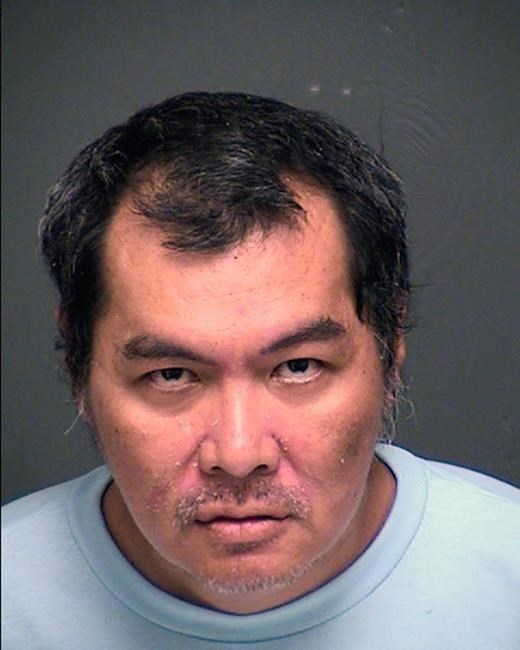
In this undated photo provided by the Arizona Department of Corrections shows Huy Chi Tran. Tran died June 12, 2018 at Banner Medical Center in Casa Grande, Ariz., where he was sent June 5 from nearby Eloy Detention Center. The 47-year-old was awaiting deportation after a prison sentence for aggravated assault. Tran’s death remains under investigation. (Arizona Department of Corrections/via AP)
June 20, 2018 - 10:43 AM
PHOENIX - Huy Chi Tran was awaiting deportation at an immigrant detention centre in Arizona when he was found unresponsive. A week later, he was dead.
Initially rushed to a medical centre, the 47-year-old Vietnamese man died after being hospitalized for a week. He was the seventh person to die in U.S. Immigration and Customs Enforcement custody during the current year that began Oct. 1.
The cause of Tran's death last week remains under investigation, but his case brings new attention to conditions for immigrants jailed in the United States as the Trump administration moves to detain more, including children separated from their parents under a new "zero tolerance" policy.
It also comes as Human Rights Watch releases a report Wednesday about the medical care some immigrants received before dying in custody.
"When you amp up the number of people in places like this, more people will die," said Nashville-based immigration attorney Andrew Free, who represents the families of three people who perished in ICE custody in recent years.
"U.S. Immigration and Customs Enforcement (ICE) takes very seriously the health, safety and welfare of those in our care, including those who come into ICE custody with prior medical conditions or who have never before received appropriate medical care," the agency said Wednesday in response to the report."Any death that happens in ICE custody is a cause for concern."
"ICE is committed to ensuring that everyone in our custody receives timely access to medical services and treatment," it added.
Tran died June 12 at Banner Medical Center in Casa Grande, where he arrived June 5 from the nearby Eloy Detention Center. Tran was awaiting deportation after serving time for aggravated assault.
In reporting Tran's death last week, ICE said it spends more than $180 million annually for detainees' medical care, including a full screening when they arrive.
In another recent case, a Honduran man who entered the U.S. illegally killed himself in a Texas jail despite guards checking on him every half-hour and a camera in his padded cell, authorities have said. Marco Antonio Munoz, 39, was found unresponsive in his cell on May 13, a day after being jailed.
The Washington Post , citing unnamed border agents with detailed knowledge of what occurred, has reported that Munoz entered the country with his wife and their 3-year-old son, and that he became enraged and had to be restrained when agents said the family would be separated.
Human Rights Watch, a nongovernmental group in New York that researches rights worldwide, expressed concern that the ever-burgeoning network of U.S. immigration detention facilities could make it harder to meet detainees' medical and mental health needs.
With a daily average of nearly 40,500 people held by ICE this fiscal year, the Trump administration now wants Congress to allocate $2.7 billion for fiscal year 2019 to jail a daily average of 52,000 people in the U.S. illegally.
Senior researcher Clara Long called Tran's death "worrying."
"Though we don't know the details of Mr. Tran's treatment, our report shows that all too often inadequate care contributes or leads to deaths in detention, with several of these over the years in the Eloy Detention Center," Long said.
For its report, Human Rights Watch had physicians with expertise in correctional health examine the official ICE death reviews of 15 detainees who died between December 2015 and April 2017. The doctors raised questions in eight cases about ICE's ability to address serious medical care deficiencies.
Dr. Marc Stern, former health services director for Washington State's Department of Corrections, analyzed ICE's formal reviews for all 15 of those detainees who died. He has investigated medical care in ICE facilities for the Department of Homeland Security in the past.
Other medical experts consulted included Dr. Robert Cohen, past director of health services on Rikers Island, and Dr. Palav Babaria, chief administrative officer of Ambulatory Services at Alameda Health System in Oakland, California.
The report mentioned several other in-custody deaths, including that of Panamanian-born JuanCarlo Jimenez-Joseph, a 27-year-old who lived most of his life in the U.S. before taking his life May 15, 2017 in the CoreCivic Stewart Detention Center (SDC) in Georgia.
His sister Karina Kelly, of Kansas City, said her brother was held in solitary confinement for 20 days despite a history of schizophrenia. "We never thought our brother would pass in a place like that," she said.
The report also mentioned Raquel Calderon de Hidalgo, who died 18 months ago after falling ill at the Eloy Detention Center. CoreCivic, which operates the facility, said it "does not provide medical or mental health care services or staffing at the Eloy Detention Center" and said the federal government is "solely responsible for providing, contracting, staffing and oversight of any medical and mental health services at Eloy."
Calderon was awaiting deportation to Guatemala in November 2016 when she suffered seizures and was taken to a local hospital where she died. An autopsy found she died from a blood clot from a leg injury suffered while crossing the desert into the U.S.
Dr. Babaria noted delays in Calderon's care, saying if she were seen earlier a "different outcome might have happened."
News from © The Associated Press, 2018